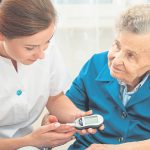Diabetes is a common life-long health condition. There are 3.3 million people diagnosed with diabetes in the UK and an estimated 590,000 people who have the condition, but don’t know it. It is a condition where the amount of glucose in your blood is too high because the body cannot use it properly.
This is because your pancreas doesn’t produce any insulin, or not enough, to help glucose enter your body’s cells – or the insulin that is produced does not work properly (known as insulin resistance).
Insulin is the hormone produced by the pancreas that allows glucose to enter the body’s cells, where it is used as fuel for energy so we can work, play and generally live our lives. It is vital for life.
Glucose comes from digesting carbohydrate and is also produced by the liver.
If you have diabetes, your body cannot make proper use of this glucose so it builds up in the blood and can’t be used as fuel.
There are two main types of diabetes: Type 1 diabetes – there is no insulin to unlock the cells and Type 2 diabetes – not enough insulin or what is there but not working properly.
What are the signs and symptoms of diabetes?
Diabetes symptoms occur because some or all of the glucose stays in the blood, and isn’t being used as fuel for energy. The body tries to reduce blood glucose levels by flushing the excess glucose out of the body in the urine. The main symptoms include:
- passing urine more often than usual, especially at night
- increased thirst
- extreme tiredness
- unexplained weight loss
- genital itching or regular episodes of thrush
- slow healing of cuts and wounds
- blurred vision
In Type 1 diabetes the signs and symptoms are usually very obvious and develop very quickly, typically over a few weeks. The symptoms are quickly relieved once the diabetes is treated and under control.
In Type 2 diabetes the signs and symptoms may not be so obvious, as the condition develops slowly over a period of years and may only be picked up in a routine medical checkup. Symptoms are quickly relieved once diabetes is treated and under control.
What happens if you ignore symptoms?
Leaving Type 1 diabetes untreated can lead to serious health problems, including diabetic ketoacidosis, which happens when a severe lack of insulin means the body cannot use glucose for energy, and the body starts to break down other body tissue as an alternative energy source.
Type 2 diabetes can affect many major organs, including your heart, blood vessels, nerves, eyes and kidneys.
If you have any of the symptoms contact your GP as early diagnosis, treatment and good control of diabetes is vital to reduce the chances of developing serious complications. For more information visit www.diabetes.org.uk or phone 0345 123 2399 Monday–Friday 9am–7pm.





